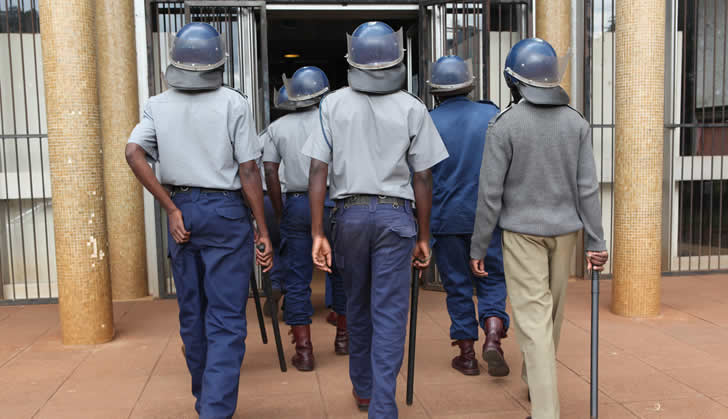PUBLIC TRANSPORT OPERATORS’ TURF WARS TURN NASTY . . . travellers caught in the crossfire
A DISTURBING video of a bus that was tailgating another, as they literally jostled for a loading bay at a terminus, surfaced recently.
The eerie visuals rekindled painful memories of the Rimbi and Zebra Kiss fatal bus crash along the Harare-Nyamapanda road in 2023.
The tragedy was an unfortunate culmination of needless and reckless competition for passengers that began at a bus rank.
It appears bus crews have learned nothing from this unfortunate incident.
And commuters have also not been spared.
Another recent video shows a visibly shaken man being aggressively accosted by rank marshals and shoved into a nearby bus against his will.
In the viral clip, a rank marshal can be heard in the background shouting to a rival bus crew: “Hamulodhe pano!” (You will not load passengers here!)
This betrays the ongoing simmering turf wars between bus crews.
Common phenomenon
Cases of clashes between rival bus companies and rank marshals harassing commuters appear to be on the rise, likely due to a sudden increase in the number of buses operating in the country.
In 2022, through Statutory Instrument 138 of 2022, under the Customs and Excise Act (Chapter 23:02), the Government lifted customs duty on the importation of new public service buses for approved operators.
This measure, which was effective from July 1, 2022, allowed registered public bus operators to import up to 20 buses per year duty-free, provided they met specific registration and tax compliance requirements.
This policy, extended until the end of April 2025, was aimed at transforming the transport sector by promoting a conventional, affordable and reliable public transportation system.
Overall, over 1 500 buses were imported as a result of the dispensation.
While this has undoubtedly been good news for commuters, offering more transport options and potentially lower fares, it has simultaneously led to an exponential increase in the number of buses on the road, resulting in fierce competition among operators.
This increased competition, while benefitting passengers, also presents challenges for bus companies navigating a brutally competitive market.
Although police and city officials are working to bring order to bus termini and roads around the country, challenges still persist. This is not only peculiar to the capital, Harare; it is also common in other cities such as Bulawayo and Mutare.
Violence/harassment
For some commuters, travelling has become a nightmare.
They become victims of rank marshals, who are not only rowdy but are sometimes violent as well.
The bus ranks themselves have become battlegrounds, where touts, popularly known as “mahwindi”, reign supreme.
“They descend on you, grabbing your luggage, dragging you,” said Maria Machiridza at the Simon Muzenda Bus Terminus in Harare.
“Resist and they threaten you . . . You have no escape. You just go with them, even if you do not wish to board their chosen bus.” This is the sad reality many commuters are facing across the country.
In Bulawayo, despite efforts for an organised transport system, touting remains rampant in some areas.
Along Harare Road, and at an illegal bus stop for the Masvingo-Beitbridge route, touts openly scramble for customers.
The city centre also battles an illegal kombi pick-up point along 6th Avenue, a persistent issue police and the Bulawayo City Council have failed to address.
There is suspicion that some top officials are benefitting from these activities, with each commuter omnibus and pirate taxi reportedly paying around US$3 daily.
Other pirate taxis’ pick-up points are controlled by marshals demanding US$3 to US$5 daily from operators.
The ill-gotten money is allegedly shared with the authorities, who conveniently turn a blind eye to what is happening.
It is the same pattern in Mutare’s central business district ranks and commuter pick-up points, where touts demand varying amounts of cash from public transport operators.
The practice is reportedly now spreading to Mutare’s high-density suburbs.
Some bus operators, under pressure to fill seats and maximise returns, seem to tacitly approve or employ the troublesome rank marshals.
Passengers Association of Zimbabwe (PAZ) national coordinator Tafadzwa Goliati is crusading against the chaos at bus ranks.
“This behaviour is an affront to human dignity. Passengers are bullied, manhandled and verbally abused by touts operating with impunity,” he said.
“Decisive action is long overdue. Passenger safety and dignity must be paramount.”
Zimbabwe Republic Police (ZRP) spokesperson Commissioner Paul Nyathi recently implored operators to “refrain from hiring touts and bouncers, who tarnish the industry’s reputation and undermine its efficiency”.
“These touts and rank marshals, often intoxicated, harass and intimidate the public,” Comm Nyathi said.
“Others engage in overt violence, theft and other criminal activities, cultivating fear among passengers.”
While arrests have been made, the prevailing challenge demands a comprehensive, sustained approach.
Acting Manicaland provincial police spokesperson Assistant Inspector Wiseman Chinyoka urged transport operators to stop paying touts.
Police and the local authority, he said, are working to restore sanity at Mutare’s public transport pick-up points.
“An ongoing operation aims to bring back sanity to urban public transport. Manicaland is no exception. The situation is improving. We work with local authorities across Manicaland, especially Mutare, to ensure no inconvenience to operators and commuters,” Asst Insp Chinyoka said.
“Operators must stop paying or employing touts. Without payment, touts have no reason to stay.
“If anyone is barred from loading their kombi for refusing to pay, then police intervene.
“Our intelligence unit monitors the situation. Operators can report cases of being barred for refusing to pay touts.”
Frustrating
The chaos extends beyond harassment.
Intense competition often leads to reckless driving.
There are numerous cases where buses are captured on video zooming down highways or precariously swerving to prevent rivals from overtaking them.
These incidents are symptoms of an industry where profit often trumps human life.
In most cases, bus crews who refuse to pay rank marshals are blocked from loading.
“It is soul-crushing,” laments a bus operator in Harare.
“They demand not less than US$8 per trip.
“My buses are often empty, while others, who pay off marshals, get decent business. How can I feed my family or keep my bus roadworthy when I cannot even get a fair chance?”
Manicaland Drivers and Transporters Association (MDATA) president Saul Tomu said operators must refuse to pay touts.
“MDATA does not condone touting,” he said.
“Commuters know their destination. Why need a tout? We operate on a first-come, first-served basis. No one pays to load first.
“Touts demand varying sums; this is corruption. We want sanity, starting with operators refusing to pay touts. They bring confusion and nightmare.
“As an association, we want sanity in this industry, and we are determined to achieve that in this province.”
Warning
Transport and Infrastructural Development Deputy Minister Joshua Sacco said intimidation, harassment, violence and lawlessness will not be tolerated.
“As the responsible ministry, we unequivocally condemn violence. We will not hesitate to impose severe penalties on anyone violating road safety rules with impunity,” he said.
“Lawlessness on our roads will not be tolerated.”
Pious Chidzenga, president of the Zimbabwe Union of Drivers and Conductors (ZUDAC), opines that touts sow confusion and cause disorder.
“Their illicit activities are not just an inconvenience; they directly contribute to accidents and fatalities, turning our daily commutes into a terrifying gamble,” observed Chidzenga.
“The actions of these rank marshals are tarnishing the image of legitimate commuter omnibus operators, eroding public trust and creating a perception of lawlessness within our industry,” added Ngoni Katsvairo, chairperson of the Greater Harare Association of Commuter Omnibus Operators (GHACCO).
“Operators bear the brunt of their violence, extortion and the resulting negative public perception.
“Passengers see the chaos and associate it with us, despite our efforts to provide safe and reliable transport.”
Solution
Katsvairo believes it is imperative that the police fully enforce regulations, ensuring that all commuter operators are duly registered under recognised associations.
Such a move would not only streamline operations and create accountability but also provide a clear framework for commuter protection, making it easier to identify and penalise unregistered or non-compliant vehicles.
The Ministry of Local Government and Public Works also bears significant responsibility, as bus termini fall under municipal jurisdiction.
It is believed local authorities urgently need to reclaim these public spaces, often privatised by informal, criminal groups.
Investment in proper rank infrastructure — demarcated loading bays, organised queuing, adequate lighting — coupled with consistent visible policing, could profoundly curb lawlessness.
Mutare City Council, for example, is registering transport operators under recognised associations to improve traffic management and passenger safety.
Four associations — MDATA, Progressive Family Trust, Urban League and SCUTA — now oversee this registration, aiming to weed out illegal transporters.
“To be recognised as legal transporters, operators will need to register their vehicles under these associations, ensuring a safer and more regulated transport system,” said Tonderai Sango, Mutare City Council’s director of spatial operations. Sunday Mail




